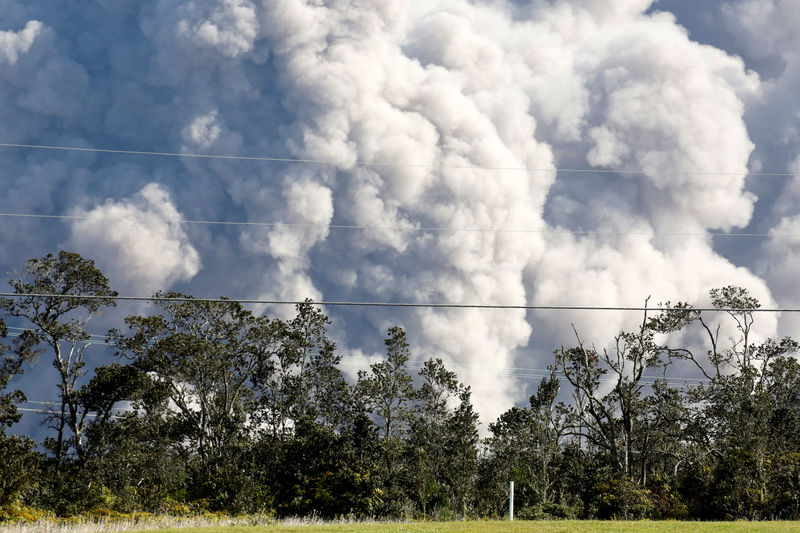 © Reuters. Ash erupts from Halemaumau Crater near the community of Volcano
© Reuters. Ash erupts from Halemaumau Crater near the community of VolcanoBy Terray Sylvester
PAHOA, Hawaii (Reuters) – Hawaii residents dealing with Kilauea’s volcanic eruption faced a potentially deadly new challenge on Sunday as lava that reached the Pacific Ocean threatened to send up laze, a hazardous mix of glass particles and noxious gas.
The new challenge came when a stream of lava from the volcano cut through Highway 137 on the south coast of Hawaii’s Big Island late on Saturday and then poured into the sea, authorities said.
The mix of erupting lava, which can reach 2,000 degrees Fahrenheit (1,093 degrees Celsius), and sea water could send up plumes of laze, a mix of hydrochloric acid, steam and volcanic glass particles, Hawaii County Civil Defense said in a statement.
“Be aware of the laze hazard and stay away from any ocean plume,” the agency said, warning that potential hazards include lung damage.
Laze — a combination of “lava” and “haze” — killed two people in 2000 when a lava flow reached the coast, and even a wisp can irritate eyes and lungs and make it hard to breath, the U.S. Geological Survey said.
Acid rain from laze has a pH, a measure of a substance’s acidity or baseness, of between 1.5 and 3.5 and “has the corrosive properties of dilute battery acid,” the agency said.
The public was warned to stay away from potential plumes of laze near where the lava is flowing into the ocean off Highway 137 near a state park.
An air quality index for Kona, about 40 miles (64 km) northwest of the eruption site, was at “orange” level, meaning sensitive groups, such as older people and those with lung disease, could be affected.
Kilauea, one of the world’s most active volcanoes, has destroyed dozens of homes and sent thousands of residents fleeing as at least 22 volcanic vents have opened up since the latest upheaval began on May 3. Besides lava, the cracks have spewed life-threatening levels of toxic sulfur dioxide gas.
The volcano also has fed vog, a hazy mix of sulfur dioxide, aerosols, moisture and dust, with fine particles that can travel deep into lungs, the Geological Survey said.
With Highway 137 severed, authorities were trying on Sunday to open up nearby Highway 11, which was blocked by almost a mile (1.6 km) of lava in 2014, to serve as an alternate escape route.
The Hawaii National Guard has warned of mandatory evacuations if more roads become blocked.
Officials at the Hawaii Volcano Authority have said that hotter and more viscous lava could be on the way, with fountains spurting as high as 600 feet (182 meters), as seen in a 1955 eruption.
(Additional reporting and writing by Ian Simpson in Washington; Additional reporting by Jolyn Rosa in Honolulu; Editing by Sandra Maler)
Source: Investing.com





























